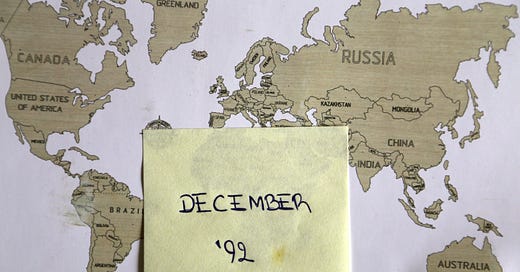December 1992.
The Federal Republic of Yugoslavia is almost completely isolated and naval transit is blocked by international sanctions [you can listen to the latest episode of BarBalkans - Podcast here].
Meanwhile, the President of Serbia, Slobodan Milošević, and the Federal Prime Minister, Milan Panić, are competing in the presidential election campaign.
Tensions are rising exponentially, as Serbian nationalists accuse Panić of conspiring with ethnic-Albanians in Kosovo. They even threaten a possible civil, ethnic and religious war, beyond the borders of Bosnia and Herzegovina.
The international community cannot accept this escalation of tensions.
But it is clear which country is considered an ally to Serbian nationalists and which the most fearsome enemy.
The Balkans seen from Moscow
The alliance between Moscow and Belgrade grows stronger, as the war in the former Yugoslavia continues.
Russian, Belarusian, Ukrainian, Cossack and Moldavian volunteers are engaged in fighting in Bosnia and Herzegovina or become advisors of Ratko Mladić, commander of the Bosnian-Serb forces.
Specifically, Milošević looks for the support of the so-called ‘red-browns’, the communist and imperialist forces that criticize the new Russian policy of dialogue with the Western world.
Following the collapse of the Soviet Union, there is a universe of nationalists in Moscow ready to prepare the new Russian “patriots”, as well as to help the “orthodox brotherhood” in the Western Balkans.
The axis between Russian nationalists and Serbian nationalists is emerging.
They share the same Orthodox faith, the hatred for the Western power and the ideological struggle against Muslim groups (at the same time, Serbs are accused by UN Security Council Resolution 798 of «systematic violence against women and girls», even in concentration camps).
Rossija, the newspaper of moderate Russian nationalists, states:
«Russia must prevent military intervention in this area. Stability in the Balkans is Russia’s stability. And today, even its unity is in question».
The Balkans seen from Washington
This increasingly strong axis between Moscow and Belgrade (at least between extremists on both sides) worries the authorities in Washington.
After a year and a half of war and the beginning of dissolution of Yugoslavia, the Western Balkans are no longer only an isolated case of regional instability in the broader international context.
Serbia is becoming the projection of Russian nationalists’ fears about the consequences of the fall of the Soviet Union (that is compared to Yugoslavia).
As a consequence, the US authorities are worried that what is currently taking place in Bosnia, Croatia and Serbia (with repercussions also in Macedonia and Kosovo) could replicate on an even larger scale in the territory of the Russian Federation.
Moreover, the US and international political contexts at the end of 1992 have to be taken into account.
Defeated by Bill Clinton in the presidential elections, George H. W. Bush has nothing to lose. This is why he hurls a radical accusation at the Serbian politicians.
At the session of the Conference on the Former Yugoslavia on December 16, the Secretary of State, Lawrence Eagleburger, compares Milošević, Mladić, Karadžić, Šešelj and Ražnatović ‘Arkan’ to «Nazi criminals», called to account for crimes against humanity:
«We know that they were being committed, and we know when and where. We also know which forces were responsible for these crimes, how they were committed and who are the commanders».
The call for an international court to prosecute war crimes comes also from the Organisation of the Islamic Conference, following the Conference on Security and Cooperation in Europe (CSCE) in November.
Summoned by King Fahd of Saudi Arabia, the Organisation of the Islamic Conference approves a moderate line, rejecting the request backed by Turkey and Iran to intervene militarily in Bosnia and Herzegovina.
Together with the US partners, Saudi Arabia passes a resolution calling on the UN Security Council - in addition to the establishment of a court for war crimes - to lift the arms embargo on Sarajevo by 15 January 1993 and to send Blue Helmets to the Bosnian and Serbian-Montenegrin borders.
Among Serbian nationalists, the idea of being alone against the whole world - alone with their Russian “orthodox brothers” - is strengthened.
Panić’ failure
In the meantime, the focus in Belgrade is all on the presidential and parliamentary elections on December 20, and the challenge between Milošević and the Federal Prime Minister Panić.
Panić stood as a candidate at the end of November, relying on a very aggressive strategy. However, one action after the other turns out to be a fiasco.
The alliance with the leader of the Democratic League of Kosovo, Ibrahim Rugova - to convince ethnic-Albanian electorate not to boycott the vote - fails.
The electoral pact is rejected by Rugova, as he does not want to risk losing credibility among his fellow citizens, in the future political frame of an independent Kosovo.
At the same time, he fails to convince the United States (that he left to move to Belgrade in June, after a 37-year stay) to lift sanctions in exchange for Milošević’ defeat.
And he does not succeed in rallying around him all the opposition to the Serbian President, shaking off the mark of “traitor”.

All this situation leads to the predictable results of December 20.
Milošević is re-elected President of Serbia with 57.5% of the vote (while only two days earlier Radovan Karadžić has been re-elected President of Republika Srpska).
Panić stops at 34.6%, and he is challenged by both chambers of the Federal Parliament on December 29.
In the Parliament of Serbia the Socialist Party of Serbia loses its absolute majority (101 seats out of 250). But this result is counterbalanced by Vojislav Šešelj’s Serbian Radical Party, which becomes the second parliamentary force with 73 deputies.
The “butcher” of Slavonia, Krajina and Bosnia, Željko Ražnatović (a.k.a. Commander Arkan), is elected MP in Kosovo and enters the Serbian Parliament.
This is the triumph of militarist, criminal, violent and illiterate nationalism. The triumph of the deep Serbia, ready to follow the illusion of greatness flaunted by the conservative and extremist wings of politics and society.
To the point that, on December 24, Eagleburger sends from Washington a telex, the so-called “Christmas warning”:
«In the event of a conflict in Kosovo provoked by Serbian action, the United States will be ready to deploy military force against the Serbs in Kosovo and against Serbia itself».
Year 1993 is about to begin. And the preview is anything but good.

If you know someone who can be interested in this newsletter, why not give them a gift subscription?
Here is the archive of BarBalkans - Podcast:
And here the summary of 1991.

















Share this post